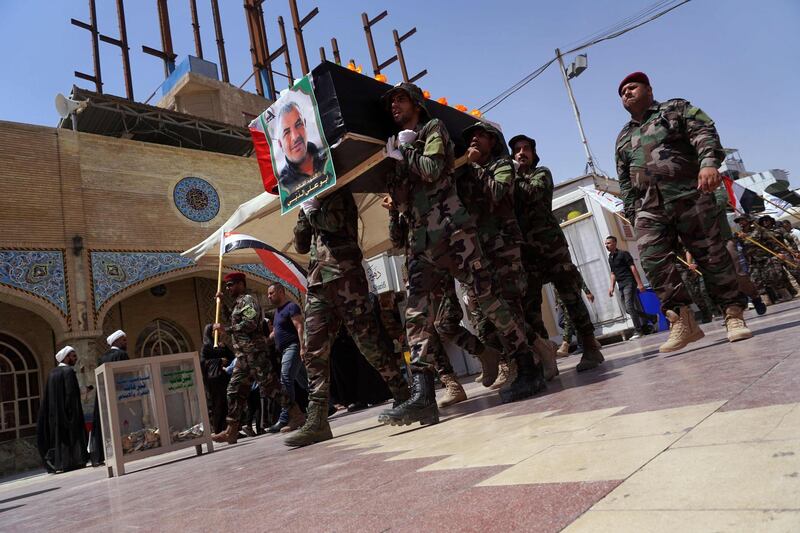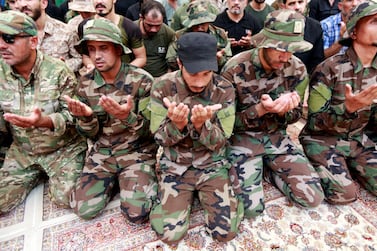The Trump administration is walking a fine line in reacting to suspected Israeli drone strikes on Iranian proxy militias in Iraq, who on Monday threatened retaliation against the US.
Since July 19, there have been at least six drone attacks on the pro-Iran Popular Mobilisation Units, or PMU, with one in Anbar province on Sunday killing at least two of its members.
US officials told The New York Times that Israel was behind some of the mystery attacks in Iraq and one US defence official told The National that the US was not involved in the operations.
But the militias and pro-Iranian political blocs in Iraq are threatening retaliation against US interests.
The Fatah Coalition said on Monday that it held the US fully responsible for the “Israeli aggression”, ”which we consider to be a declaration of war on Iraq and its people".
On Friday, the Iraqi Kataib Hezbollah militia issued “a final warning to the American enemy that any new targeting will be followed with a decisive and harsh response”.
“Your forts will not protect you as they are all within our missiles' reach,” it said.
A US State Department official told The National that while Washington supported "a strong, free, and sovereign Iraq", it also supported Baghdad's "efforts to counter threats to Iraq's sovereignty from Iran-backed militias".
On Sunday, Secretary of State Mike Pompeo called Israeli Prime Minister Benjamin Netanyahu and offered his support.
The US ambiguity and tacit support for Israel is expected but could complicate the presence of about 5,200 US service members in Iraq, experts said.
"The working theory among many Iraqi politicians and intellectuals is that Israel would not strike in Iraq unless it has a green light from the United States," Abbas Kadhim, director of the Iraq initiative at the Atlantic Council, told The National.
“This puts the utility of the current US-Iraqi partnership in question again," he said.
“If more bombings take place and Israel is blamed for them, the opponents of a strong US presence in Iraq will have enough momentum to force major changes in US-Iraqi relations."
Daniel Serwer, a scholar at the Middle East Institute, said Israeli attacks in Iraq “could increase Iraqi political resistance to the continuing American military presence there”.
But they “could also weaken militias there who are closely tied to Iran, which the Americans would like", Mr Serwer said.
He said the US did not show an urge to ease the situation in Iraq.
“If Washington wanted de-escalation, it would seek to restrain the Israelis," Mr Serwer said. "Is there any sign of that?
"These attacks look to me like an Israeli contribution to the maximum pressure campaign.”
Jonathan Schanzer, vice president of research at the Foundation for Defence of Democracies, said that Israeli attacks on the PMU militias would enforce US interests.
“The Iran-backed PMUs have long posed a potential threat to American forces in the region," Mr Schanzer said.
"I’m not sure how Israeli strikes would make them more of a threat. If anything, they might deter them."
“As Iraq has slowly but surely allowed its territory to be exploited by Iran and its proxies, the Israelis have slowly but surely developed a military strategy for countering Iran and its proxies across the Middle East."
Mr Schanzer said he did not think retaliation by the militias against US troops and economic interests in Iraq would be the first option for Iran.
“The Trump administration has warned Iran that attacks on US personnel would be met with a harsh response," he said. "Striking American troops, even by proxy, would likely cross the line.
“Iran knows this and for that reason I question whether the regime in Tehran would test America in such a manner.”
Iraqi Prime Minister Adel Abdul Mahdi was expected to visit Washington this summer but the trip is now tentatively planned for October.






